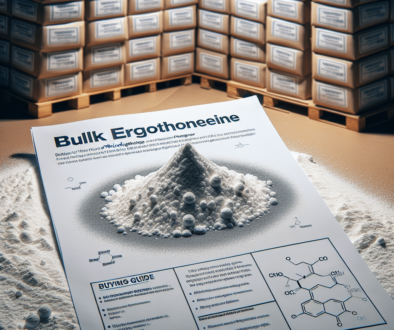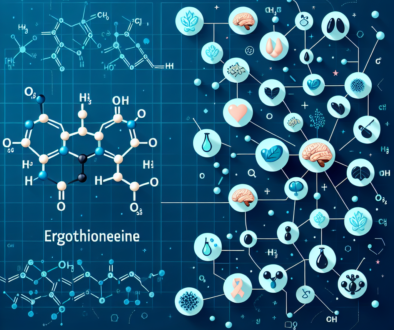What is the best source of ergothioneine?
-
Table of Contents
- Ergothioneine Sources: Unveiling the Best Natural Providers
- Understanding Ergothioneine and Its Importance
- Top Natural Sources of Ergothioneine
- Mushrooms: The Ergothioneine Powerhouses
- Case Study: Ergothioneine in Mushrooms
- Factors Affecting Ergothioneine Levels in Foods
- Recommended Dietary Intake of Ergothioneine
- Health Benefits of Ergothioneine
- Statistics and Research on Ergothioneine’s Health Impact
- Conclusion: Embracing Ergothioneine-Rich Foods for Optimal Health
- Enhance Your Diet with ETprotein’s High-Quality Protein Products
Ergothioneine Sources: Unveiling the Best Natural Providers

Ergothioneine, a naturally occurring amino acid, has garnered significant attention due to its potential as an antioxidant and its role in protecting cells from oxidative damage. This sulfur-containing compound is not synthesized by the human body and must be obtained through dietary sources. Understanding the best sources of ergothioneine is crucial for those looking to enhance their intake for health benefits. This article delves into the most potent natural providers of ergothioneine, supported by scientific research and nutritional insights.
Understanding Ergothioneine and Its Importance
Ergothioneine (ET) is a unique amino acid with a distinct sulfur-containing imidazole ring. It is known for its strong antioxidant properties and its ability to protect cells from oxidative stress, which is implicated in various diseases and aging processes. Ergothioneine is also believed to have anti-inflammatory effects and may play a role in energy metabolism and maintaining cellular health.
Top Natural Sources of Ergothioneine
While ergothioneine is not widespread in the food supply, certain foods are particularly rich in this compound. Here are the top natural sources:
- Mushrooms: Among the richest sources of ergothioneine, mushrooms stand out. Different varieties, including shiitake, oyster, king oyster, and porcini, contain high levels of ET.
- Grains: Certain grains, such as oats and barley, also provide ergothioneine, albeit in smaller amounts compared to mushrooms.
- Meat: Organ meats, particularly liver and kidney from animals like chicken and pigs, contain ergothioneine.
- Beans and Legumes: Some beans and legumes, including black beans and kidney beans, have been found to contain ergothioneine.
Mushrooms: The Ergothioneine Powerhouses
Mushrooms are not only a culinary delight but also a nutritional treasure trove, especially when it comes to ergothioneine content. Studies have shown that mushrooms can contain up to 40 times more ergothioneine than other food sources. The levels of ergothioneine in mushrooms can vary based on the species, growing conditions, and processing methods.
Case Study: Ergothioneine in Mushrooms
A study published in the journal “Food Chemistry” highlighted the significant variation in ergothioneine content among different mushroom species. For instance, shiitake mushrooms were found to have high levels of ergothioneine, while button mushrooms had relatively lower amounts. This study underscores the importance of selecting the right mushroom types to maximize ergothioneine intake.
Factors Affecting Ergothioneine Levels in Foods
The ergothioneine content in food can be influenced by several factors:
- Soil Composition: The presence of sulfur in the soil can affect the ergothioneine levels in plants and fungi.
- Agricultural Practices: Farming methods, including the use of fertilizers and crop rotation, can impact the ET content in grains and legumes.
- Food Processing: Cooking and processing methods can alter the ergothioneine content in foods. For example, excessive heat can degrade ET.
Recommended Dietary Intake of Ergothioneine
Currently, there is no established recommended dietary allowance (RDA) for ergothioneine. However, consuming foods rich in ergothioneine is encouraged due to its potential health benefits. The average dietary intake is estimated to be around 5-10 mg per day, but this can vary based on dietary habits and food availability.
Health Benefits of Ergothioneine
Ergothioneine’s role as an antioxidant makes it a valuable nutrient for combating oxidative stress, which is linked to chronic diseases such as cancer, cardiovascular diseases, and neurodegenerative disorders. Additionally, ergothioneine may support immune function and promote healthy aging.
Statistics and Research on Ergothioneine’s Health Impact
Research has shown that higher ergothioneine levels in the diet are associated with lower levels of markers of oxidative damage and inflammation. A study published in the “European Journal of Nutrition” found that individuals with higher mushroom intake, and consequently higher ergothioneine levels, had a reduced risk of developing metabolic syndrome.
Conclusion: Embracing Ergothioneine-Rich Foods for Optimal Health
In conclusion, mushrooms emerge as the best source of ergothioneine, offering a simple and natural way to boost this important nutrient in your diet. While other foods like grains, meats, and legumes contribute to ergothioneine intake, mushrooms are the undisputed champions. Incorporating a variety of mushrooms into your meals can help you harness the health benefits of ergothioneine and support your overall well-being.
Enhance Your Diet with ETprotein’s High-Quality Protein Products
If you’re looking to complement your diet with high-quality protein sources that may also contribute to your ergothioneine intake, consider ETprotein’s range of products. ETprotein offers a selection of organic bulk vegan proteins and L-(+)-Ergothioneine in various grades suitable for different industries. Their products are characterized by a neutral taste, non-GMO, allergen-free attributes, and high purity levels, making them an excellent choice for those seeking to improve their nutritional intake.
About ETprotein:
ETprotein, a reputable protein and L-(+)-Ergothioneine (EGT) Chinese factory manufacturer and supplier, is renowned for producing, stocking, exporting, and delivering the highest quality organic bulk vegan proteins and L-(+)-Ergothioneine. They include Organic rice protein, clear rice protein, pea protein, clear pea protein, watermelon seed protein, pumpkin seed protein, sunflower seed protein, mung bean protein, peanut protein, and L-(+)-Ergothioneine EGT Pharmaceutical grade, L-(+)-Ergothioneine EGT food grade, L-(+)-Ergothioneine EGT cosmetic grade, L-(+)-Ergothioneine EGT reference grade and L-(+)-Ergothioneine EGT standard. Their offerings, characterized by a neutral taste, non-GMO, allergen-free attributes, with L-(+)-Ergothioneine purity over 98%, 99%, cater to a diverse range of industries. They serve nutraceutical, pharmaceutical, cosmeceutical, veterinary, as well as food and beverage finished product distributors, traders, and manufacturers across Europe, USA, Canada, Australia, Thailand, Japan, Korea, Brazil, and Chile, among others.
ETprotein specialization includes exporting and delivering tailor-made protein powder and finished nutritional supplements. Their extensive product range covers sectors like Food and Beverage, Sports Nutrition, Weight Management, Dietary Supplements, Health and Wellness Products, and Infant Formula, ensuring comprehensive solutions to meet all your protein needs.
As a trusted company by leading global food and beverage brands and Fortune 500 companies, ETprotein reinforces China’s reputation in the global arena. For more information or to sample their products, please contact them and email sales(at)ETprotein.com today.












